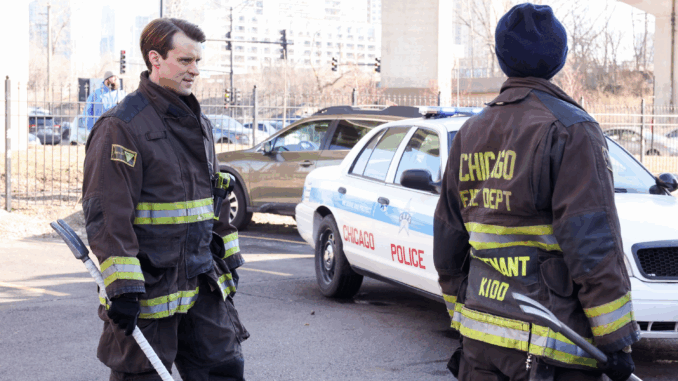
The final siren of Chicago Fire Season 13 brought with it the usual mix of high-stakes drama, emotional resolutions, and new beginnings. However, the excitement over Stellaride’s burgeoning family and the shift in leadership at Firehouse 51 was tempered by the stark reality of two major character departures: Darren Ritter, played by Daniel Kyri, and Sam Carver, played by Jake Lockett, are officially hanging up their hoses.
This news, confirmed by multiple sources and acknowledged by the actors themselves, represents a significant and painful cast shakeup. What makes these exits particularly hard for the devoted One Chicago fanbase is the reported reason behind them: a wave of budget cuts sweeping across the entire Dick Wolf universe. These aren’t just characters leaving for narrative reasons; they are, in a sense, casualties of the changing economics of network television.
The loss of Ritter, a long-standing fan favorite and one of the show’s few prominent LGBTQ+ characters, and Carver, who was central to one of the show’s most compelling ‘will-they-won’t-they’ romances, will irrevocably change the dynamic of Firehouse 51 and leaves two major story threads abruptly severed.
The Budget Reality: Why Fan-Favorites Were Sacrificed
In an era where streaming revenue, contract negotiations, and the rising cost of production dominate network decisions, even highly rated, long-running hits like Chicago Fire are forced to make tough choices. Reports indicate that the departures of both Daniel Kyri and Jake Lockett are part of a broader, network-mandated effort to trim the production budget across the entire One Chicago and Dick Wolf franchises.
This financial reality is often reflected in smaller, creative shifts—like reducing the required episode count for veteran actors—but the outright removal of series regulars, particularly newer ones, is a drastic measure. The unfortunate implication is that, in the eyes of network accountants, Ritter and Carver were deemed more “expendable” than the veteran, high-salary cast members.
Daniel Kyri’s Darren Ritter: A Loss of Stability and Diversity
Darren Ritter has been a fixture at Firehouse 51 since Season 7, starting as a nervous candidate and blossoming into a confident, respected firefighter on Engine 51. His character arc was a testament to perseverance, overcoming debilitating anxiety to become a vital member of the team, mentored closely by Randall “Mouch” McHolland.
Ritter’s departure is painful for two main reasons:
- Lack of Narrative Payoff: Despite being a beloved character, Ritter was often relegated to background plots, particularly in Season 13. Just when the show began to scratch the surface of his personal life (including his recent breakup with boyfriend Dwayne), his story is cut short, leaving fans without the meaningful closure they expected.
- Diversity Impact: Ritter’s presence as one of the few prominent Black and openly gay main characters provided important representation in the One Chicago universe. His exit diminishes the diversity of the central cast, a trend that is often met with understandable frustration from the fanbase.
Kyri himself addressed the news on social media, expressing sadness but also a sense of forward momentum, suggesting that for him, “it’s time to move on.”
The Carver Conundrum: A Romance on the Brink
Sam Carver, played by Jake Lockett, was introduced in Season 11 and quickly became a major force, particularly due to his compelling personal struggles and, most importantly, his undeniable chemistry with paramedic Violet Mikami (Hanako Greensmith). Their relationship—dubbed #Carvlet by fans—was the clear successor to the great Fire romances of Casey/Brett and Severide/Kidd.
The Season 13 finale specifically delivered a devastating cliffhanger for Carver and Violet that directly sets up his exit:
- A Step Towards Sobriety: Carver, dealing with personal demons, realized that he needed a stable, fresh start for his sobriety. This led him to apply for a firefighter position in Denver.
- The Confession: Despite his decision to leave, the finale saw Carver and Violet finally confess their profound love for one another in a classic, rain-soaked, heart-wrenching scene—a classic “happy ending” that simultaneously serves as a brutal farewell.
The announced departure means that the highly anticipated #Carvlet relationship is over before it truly began. This abrupt end leaves Violet at a painful crossroads: pursue the long-distance relationship with a deeply wounded heart, or acknowledge that her love story with Carver was a beautiful, but fleeting, chapter. For fans who were heavily invested in their dynamic, this feels like a major bait-and-switch, sacrificing a powerful character arc for budget expediency.
The Void at Firehouse 51 and Season 14’s Challenges
The combined loss of two squad members will force the remaining members of Firehouse 51 to adjust rapidly, both professionally and personally.
Professional Shifts:
- Engine 51 and Truck 81: Both companies will feel the strain of losing seasoned firefighters. The show will inevitably introduce new recruits, but integrating them organically while maintaining the firehouse’s established camaraderie will be a major creative challenge for Season 14.
- A New Dynamic for Violet: Hanako Greensmith’s Violet Mikami will be left to pick up the pieces, and her character arc will likely center on professional strength contrasting with her personal heartbreak. This could lead to a tougher, more guarded Violet, which, while dramatically compelling, may lose some of the lightheartedness she often provided.
The Larger Franchise Question:
These budget-driven cuts raise uneasy questions about the long-term future of the entire One Chicago universe. If the network is willing to sever two engaging characters with strong fan connections, what does this mean for the remaining veteran cast members, whose contracts will also be up for renegotiation?
The #Ritter and #Carver exits serve as a stark reminder that in the high-stakes world of network television, creative storytelling sometimes takes a back seat to the bottom line. While Chicago Fire excels at giving characters dramatic, heroic send-offs, these budget-mandated departures feel less like a narrative choice and more like a cruel hand dealt by the industry. The fans deserved more, and the show now faces the tough task of making their forced absence feel like a satisfying chapter closure, rather than an abrupt cancellation.
